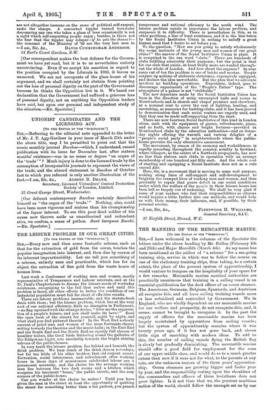[To TUE Roma OF THE "SPECTATOR."] Srg,—E very now and
then some fantastic scheme, such as that for the extraction of gold from the ocean, touches the popular imagination into interest, and then dies by reason of its inherent impracticability. Let me tell you something of a scheme, entirely sane and practicable, which has for its
object the extraction of fine gold from the waste hours of human lives.
Last week a Conference of working men and women, mostly representative of Temperance and Labour interests, met at the St. Paul's Chapterhouse to discuss the leisure needs of workaday existences, recognising to the full that unless and until this problem is faced, all other efforts to better the condition of our industrial population must fall far short of effeative results. There are labour problems innumerable, and the statute-book deals with them; but the leisure problem, which lies at the very root of our national efficiency, finds no champion in Parliament, —no flag upraised with the strange device, " Give me the organisa- tion of a people's leisure, and you shall make its laws !" Bead the open book of the streets for yourself, night by night, and what shall you find pictured therein ? In the West End a steady current of jaded men and women of the more fortunate classes setting towards the theatres and the music-halls; in the East End and the South End and the North End an equally full stream of humbler toilers, like tired birds fluttering round the galleries of the Eddystone Light, sots inevitably towards the bright shining saloons of the public-houses.
In very truth the leisure problem lies behind and beneath the drink problem. We hear much of the drink demon nowadays, but far too little of his elder brother, that old serpent ennui. Recreation, social intercourse, and refreshment after working hours in these days of monotonous subdivided labour are a paramount necessity, and the choice for the average working man lies between the two dark rooms and a kitchen which comprise his tenement "home," the public streets, and tho cosy corners of the public-house.
Can you wonder at the choice he makes ? Until you have given the man in the street at least the opportunity of quitting the street for something better than a bar parlour, you preach
temperance and national efficiency to the north wind. The leisure problem equals in importance the labour problem, and surpasses it in difficulty. There is nevertheless in this, as in other problems, a line of least resistance, and it is the line taken by the Social Institutes Union in seeking to satisfy a great human need that I desire to set before you. To the question, "How are you going to satisfy wholesomely the social instincts of the young men and women of our great cities ? " the answer of the Social Institutes Union is plain. It is comprised in the one word "clubs." There are hundreds of clubs fulfilling admirably their purposes; but the point is that for one club that exists, at least thirty more are wanted through- out the whole of London. And how about the expense ? In nine cases out of ten the problem is one of bricks and mortar. People conjure up notions of elaborate structures, expensively equipped, and declare the idea unworkable. But the plan that we advocate involves no building operations. Experience, indeed, goes to discourage experiments of the "People's Palace" type. The atmosphere of a palace is not "clubbable." The new departure made by the Social Institutes Union has been in the direction of using unoccupied halls and rooms in Board-schools and in church and chapel premises and elsewhere, at a nominal rent to cover the cost of lighting, heating, and caretaking, as nurseries for budding clubs, and it has been proved to demonstration that such social centres are eagerly used, and that they can be made self-supporting from the start. There are now fourteen Social Institutes of this kind in London alone, each with its equipment of games, refreshments, piano, and so forth, with classes and bright lectures—provided in Board-school clubs by the education authorities—and on Satur- day nights offering the warmth and various delights of a "people's social party" in neighbourhoods where the public.. house provides the only alternative amusement.
The movement, by reason of its economy and workableness, is rapidly spreading throughout the country, notably in Scotland, where Glasgow, as the centre of a Northern propaganda, has now no less than sixteen such clubs in operation with an average membership of one hundred and fifty each. And the whole cost of starting and equipping a Social Institute does not as a rule exceed .250.
Here, Sir, is a movement that is moving to some real purpose, seeking along lines of self-support and self-development to brighten the cramped lives of working men and women, and thus gradually to repair that grave defect in our social conditions under which the welfare of the people in their leisure hours has been left so largely out of reckoning. We shall be very glad if some of your readers who feel their responsibilities as citizens would inquire a little further into our methods, and would help us with their money, their influence, and, if possible, by their personal service.
General Secretary, S.I.U.
37 Norfolk Street, Strand, W.C.










































 Previous page
Previous page